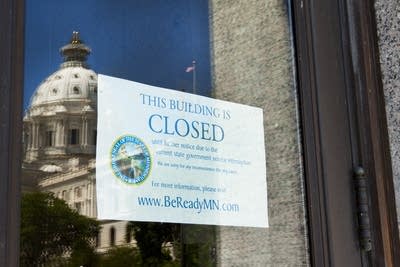No special session today: Lobbyists descend on Capitol
Go Deeper.
Create an account or log in to save stories.
Like this?
Thanks for liking this story! We have added it to a list of your favorite stories.

DFL Gov. Mark Dayton and Republican legislative leaders plan to meet again today to hammer out the details of bills to end the state government shutdown. They talked throughout the weekend but did not finalize all the budget bills in time for a special session Monday.
With billions of dollars at stake, lobbyists, union representatives and special interest groups competed for lawmakers' attention over the weekend, to make a final plea for funding.
Lobbyist Gary Carlson is typical. He was supposed to go out of town this weekend to visit family.
"With some of the uncertainty about where things are headed at the Capitol, I decided to stay in town and head into the office," said Carlson, intergovernmental relations director for the League of Minnesota Cities.
Turn Up Your Support
MPR News helps you turn down the noise and build shared understanding. Turn up your support for this public resource and keep trusted journalism accessible to all.
As Dayton and Republicans huddled inside the locked state Capitol this weekend, Carlson sent Twitter messages and phone texts to people inside the building asking for information. He didn't get many updates on the bills lawmakers were trying to write, based on the agreement reached Thursday.
Carlson says lobbyists and special interest groups vying for legislators attention banded together to figure out what's going on.
"We try to each provide whatever bits and pieces we can glean from discussions from staff and legislators and others that are in the process," Carlson said. "Collectively we can put together maybe 5 percent or 10 percent of what the details are, but that's better than no information at all."
"It's been so many weeks since the Legislature adjorned, will anyone remember what our concerns were?"
Carlson is also trying to respond to questions from city officials he represents throughout Minnesota. Those cities are scheduled to receive an infusion of state funding, called Local Government Aid, or LGA, on Wednesday.
"The cities were notified of those amounts last July, and they built their budgets when they finalized their budgets in December," he said. "Now we're six to seven months into the city calendar fiscal year, and there's the possibility that there basically could be retroactive reductions in those amounts."
Carlson has been going through versions of budget bills which were passed by the Republican-controlled Legislature, and vetoed by the governor during the legislative session. He's reading Dayton's veto letters to try to figure out what the governor will and won't compromise on.
So is Sue Abderholden, executive director of the National Association on Mental Illness in Minnesota, or NAMI. She says the worst-case scenario for her organization is if the final bills include the cuts to MinnesotaCare and Medical Assistance that legislators passed and the governor vetoed.
Abderholden has emailed key Republicans and Democrats to remind them of the people who depend on those services.
"It's been so many weeks since the Legislature adjorned, will anyone remember what our concerns were?" she said.
But Abderholden knows many interest groups are making the same case right now.
"On one hand we're together. We don't say, 'Fund us, don't fund them,' but everyone's making their pitch as to why the group that they represent needs those funds restored. and again, we're fighting over the scraps at the table," she said.
Sen. Terri Bonoff, DFL-Minnetonka, says she can understand interest groups' frustration, but she doesn't think there will be any big surprises in the final bills.
"The bills that are being negotiated are very similar to what happened all during the session," said Bonoff. "I think people actually should take comfort that there are not major departures from what was going on during the legislative session."
But Bonoff is concerned that the bills being finalized won't have enough support to pass the Legislature.
"This is a fragile deal," she said. "Because the solution was so distasteful to both sides, it is not going to be easy to put this deal together at the end of the day."
One of the lawmakers who isn't sure if he can support the deal is Sen. David Brown, R-Becker. Brown says he can't support the part of the deal that would delay 40 percent of payments to schools. Brown says he's told his party leadership about his concerns "to some extent."
"I think they'll have that in their mind. I'm just waiting to see where things land," said Brown. "I'm waiting to get a call to say, 'Come on down to St. Paul, we're going to get this done."
But Brown says he won't really know how he'll vote until he sees the new bills.
Dear reader,
Political debates with family or friends can get heated. But what if there was a way to handle them better?
You can learn how to have civil political conversations with our new e-book!
Download our free e-book, Talking Sense: Have Hard Political Conversations, Better, and learn how to talk without the tension.






